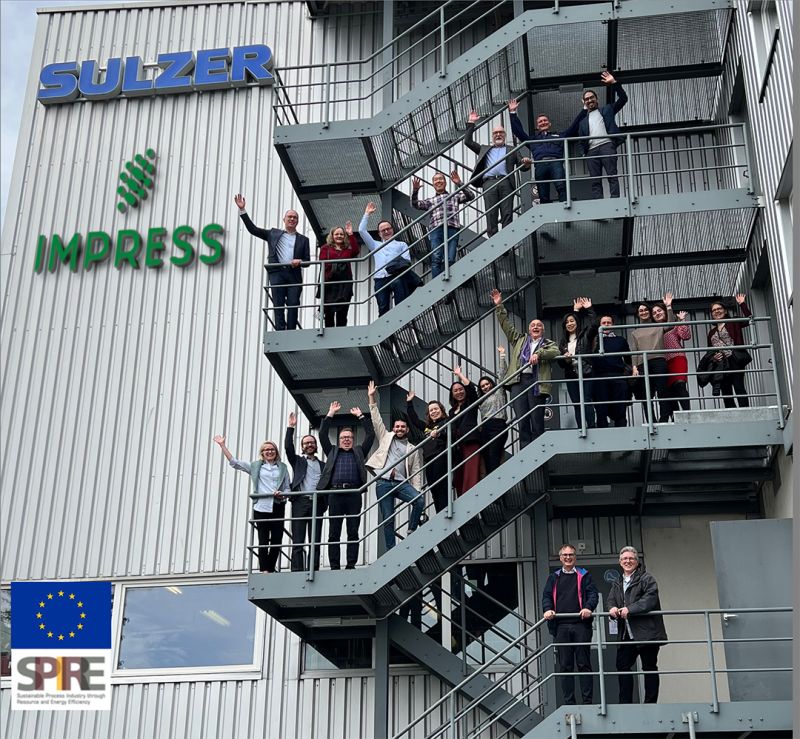
Host of the latest meeting of the EU funded project IMPRESS (Integration of efficient downstreaM PRocessEs for Sugars and Sugar alcohols), Sulzer Chemtech showcased all project partners the purification technologies that will support the novel biorefinery. Members of the consortium were able to look at a pilot plant that purifies glycols from plant-based resources to achieve extremely high grades and support greener downstream chemical manufacturing.
The IMPRESS project focuses on the creation of a novel hybrid biorefinery technology for the production of base chemicals from renewable resources. This is now in its final stages and well on target for project partner Avantium to build a demonstration plant in Delfzijl, Netherlands. To discuss the latest updates and plan the next stages, the member of the consortium Sulzer Chemtech, organized the latest consortium meeting near its pilot plant and testing facilities in Allschwil, Basel, Switzerland.
During the event, 20 experts from all 10 IMPRESS affiliated organizations were able to learn more about the custom downstream solutions developed by Sulzer Chemtech to support the initiative. Additionally, attendees could look at the pilot-scale purification plants developed in Allschwil. This leverages the company’s advanced distillation and crystallization technologies to obtain cost-effective, high-quality monoethylene glycol (plantMEG™) and monopropylene glycol (plantMPG™). Thanks to the great purity level of the resulting plant-based products, it is possible to use them as building blocks for a wide variety of chemicals, including polyethylene furanoate (PEF) bioplastics and polyethylene terephthalate (PET).
The setup presented at the meeting is now being scaled up to support its implementation at the Delfzijl demonstration plant in Delfzijl. Therefore, the successful creation of such downstream processing trains represents a crucial step forward in the commercialization of effective, fully integrated, second-generation biorefinery complexes that offer a comprehensive portfolio, rather than just bioethanol. Ultimately, this opens the door to more sustainable chemical, polymer and plastic manufacturing.
Uwe Boltersdorf, Division President at Sulzer Chemtech, comments: “We are excited to have completed the development of an innovative purification system for plant-based glycols, as well as to start taking the next step in the scaling up of the IMPRESS concept. The production of high-grade glycols from renewable resources requires advanced separation technologies that can handle impurities and other chemicals that greatly differ from conventional, fossil fuel feedstocks. Thanks to the close collaboration of our committed R&D team with all IMPRESS partners, we were able to develop a highly effective, commercially feasible solution. This will help make the entire IMPRESS novel biorefinery a value-adding plant for manufacturers, driving the adoption of greener practices and technologies.”
IMPRESS project has received funding from the European Union’s Horizon 2020 research and innovation program under grant agreement No 869993. The consortium consists of ten industry and academic organizations across Europe: Avantium, Sulzer Chemtech, KNAUER, Centre National de la Recherche Scientifique (French National Center for Scientific Research, CNRS), Lenntech, Vogelbusch Biocommodities, Process Design Center (PDC), Sphera, Aalto University and South-Eastern Finland University of Applied Sciences (Xamk).
Source
Sulzer, press release, 2023-05-31.
Supplier
Aalto University
Avantium Technologies B.V.
Centre national de la recherche scientifique (CNRS)
KNAUER Wissenschaftliche Gerätebau Dr. Ing. Herbert Knauer GmbH
Process Design Center BV
South-Eastern Finland University of Applied Sciences (Xamk)
Sphera Solutions
Sulzer Chemtech Ltd.
Vogelbusch Biocommodities GmbH
Share
Renewable Carbon News – Daily Newsletter
Subscribe to our daily email newsletter – the world's leading newsletter on renewable materials and chemicals










